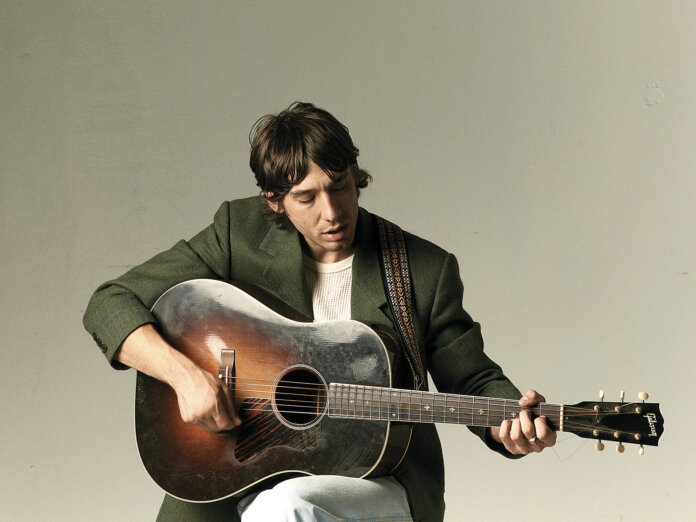There’s always been a fine line between the nostalgic and the timeless. Both acknowledge the past, of course, but one depends upon former glories to justify its present, while the other’s historical ties are a mere bedrock for its future. The line’s becoming ever finer, too, as pop continues to eat itself. Contrived familiarity, after all, is a comforting illusion, and if recent legal cases – like the Marvin Gaye estate’s against Ed Sheeran – have exposed the form’s structural limitations, advancing technology has also allowed easier appropriation of production techniques.
Not that the nostalgic is purely worthless, nor that to innovate is the only ambition of value. Indeed, these qualities can be mutually beneficial, and Sam Burton’s second album – barring two cassettes, recorded in his bathroom for Chthonic Records – embraces each, largely successfully. Produced by Jonathan Wilson at his Topanga Canyon studio, it conjures up earthy aromas of a bygone Laurel Canyon and soft rock’s subsequent, slick sophistication; indeed, there are moments that might suit Mapache Records’ marvellous new One Mile From Heaven compilation of privately pressed 1970s songwriters. Its polish, though, is distinctively contemporary, in the manner of Wilson’s work with Angel Olsen and Father John Misty, not to mention his own releases.
Admittedly, Wilson’s simply tweaked the style of 2020’s Jarvis Taveniere-produced I Can Go With You, opening up Burton’s horizons from the poolside terrace to the mountains beyond. In this, he’s much aided by keyboardist Drew Erikson, whose gracious yet never ostentatious string arrangements elevate multiple tunes. Sometimes redolent of Glen Campbell’s work with Jimmy Webb, they shimmer over the starry-eyed “Maria” and weep beneath “Looking Back Again”’s wings, while “I Don’t Blame You” is introduced like Robert Kirby does on Nick Drake’s Bryter Layter.
Still, the more one listens, the more one recognises that Burton’s a step removed from such esteemed forerunners. It’s true that at times, as on “I Don’t Blame You”’s highest notes, his faintly tremulous vocals are like a restrained Tim Buckley, and there are also moments when he exhibits a reedy air of John Lennon, while his songs move at the lugubrious pace of Neil Young’s After The Goldrush. Yet this wistful fug is ambiguous, with Wilson’s production inventive in its disorientating artifice, like a cowboy crying into a martini. Something’s off, in a mysterious but appealing fashion. One’s thus as likely to contemplate these icons as the Beck of 2002’s Sea Change, the Bill Callahan of 2009’s Sometimes I Wish I Were An Eagle, the Sylvie of last year’s Sylvie, not to mention the Weyes Blood of And In The Darkness, Hearts Aglow.
Naturally, to avoid accusations of overexploiting nostalgic instincts, Burton needs to deliver memorable songs. Natalie Mering, whose UK tour he recently opened, leaned into Karen Carpenter to bring Weyes Blood to a bigger audience. Burton, on the other hand, appears content to amble at a leisurely, sometimes forlorn pace, trusting his melodies to bed in over the time that Wilson’s muted but refined production invites. Indeed, few tunes break the 100bpm barrier, and two – “I Don’t Blame You”, which calls upon Townes Van Zandt’s tenderness, and the drowsy “I Go To Sleep” – are gentle waltzes. Fortunately, though it can sometimes take a moment to differentiate one track from another, such lethargy suits him: having wallowed in opener “Pale Blue Night”’s lush melancholy, he revels in the breezy “Empty Handed” and saunters carefree through the classy “Coming Down On Me”, noting on “Long Way Around” that “I could linger on behind and get there still”.
That these songs weren’t born of LA, where Burton lived for several years until late 2020, and to which he’s since returned, is likely significant. Instead, they emerged while he travelled back to childhood roots in Salt Lake City, then on to rural northern California, where he worked on his grandmother’s farm. Consequently, they’re less the reiteration of a sound whose history once surrounded him than a reimagining, crafted at a distance, enabled afterwards by Wilson. If nowadays almost everything sounds like something, what ultimately matters is whether this serves a purpose. For Burton, using the past to shape Dear Departed insists we pay attention in the present, and that’s the least these songs deserve.



